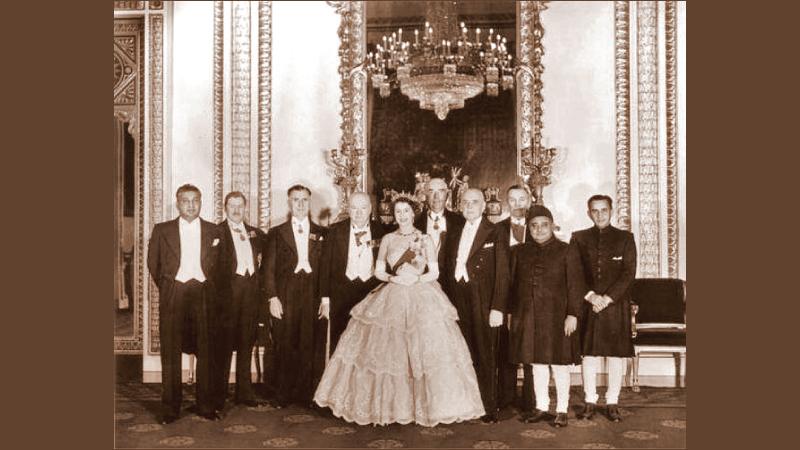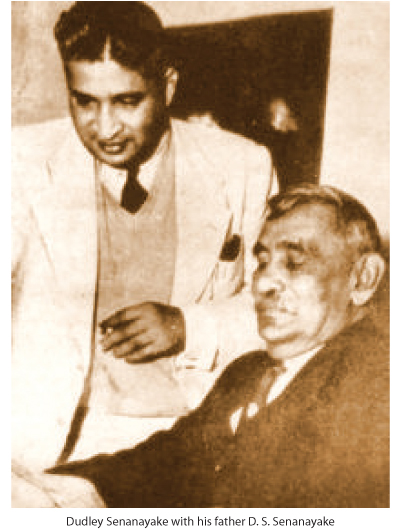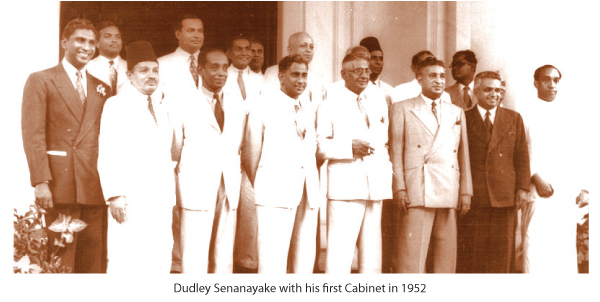
Dudley Senanayake was appointed as the second Prime Minister of Ceylon on March 26, 1952, following the death of his great father, D. S. Senanayake, the first Prime Minister of Ceylon and the ‘Father of the Nation.’ Dudley Senanayake, 40, became the youngest Prime Minister in the Commonwealth then and continues to remain the country’s youngest ever Premier.
Dudley Senanayake served as the Prime Minister of Ceylon in 1952 (first term), from 1952 to 1953 (second term), in 1960 (third term) and from 1965 to 1970 (fourth term) and as the Leader of the Opposition from 1960 to 1964. His leadership as the Prime Minister was associated with democratic socialist policies focused on agricultural and educational reforms.
He treated everyone as his kith and kin throughout his 37-year political career. His honesty, integrity and kindness remain unquestionable till this moment. During his reign there was no religious or communal violence. He was an example to all the leaders through his impeccable leadership qualities. His name is etched in the hearts of Sri Lankans as the “Bath Dun Piya.”
 Dudley Senanayake never married and remained a lifelong bachelor. He is respected as a statesman of simplicity, democratic toleration and moderation. He is remembered for carrying forward his father’s legacy and credited with restoring the country’s economy.
Dudley Senanayake never married and remained a lifelong bachelor. He is respected as a statesman of simplicity, democratic toleration and moderation. He is remembered for carrying forward his father’s legacy and credited with restoring the country’s economy.
Birth and education
Dudley Shelton Senanayake was born on June 19, 1911 in Bothale. It was a ‘Poson Poya,’ an auspicious day for Buddhists as it signifies the advent of Buddhism to the country. When the news of the birth reached his father, he was in the company of Dudley’s grandfather, Don Spater Senanayake who was ceremonially gifting the land owned by the Senanayake family to the village temple.
Dudley, was the eldest son of Molly Senanayake and D.S. Senanayake. His younger brother was Robert Parakrama Senanayake. Both brothers were educated at St. Thomas’s College, Mount Lavinia, where their illustrious father had also studied from 1882 to 1902. All three of them, played cricket for the college and wore the prestigious “Blue-Black-Blue Blazer” and “Cap’.
Robert played cricket for St. Thomas’s from 1927 to 1932 and captained at the ‘Battle of the Blues.’Dudley was a model student who excelled in both academics and sports. Dudley, played at the Royal-Thomian encounters in 1927, 1928 and 1929, and in the first innings of the 48th ‘Big Match,’he scored 48 not out. Dudley gained colours in Hockey, Cricket, Boxing and Athletics. Hewas made the Head Prefect and was awarded the prestigious ‘Victoria Gold Medal’ for the most outstanding student.
Dudley then entered the Corpus Christi College, University of Cambridge to read his Natural Science Tripos. After graduation, he gained admission to the Middle Temple as a Barrister and continued his passion for cricket and boxing. He returned to Ceylon in 1935 at the age of 24, having completed his studies in law, took his oaths as an advocate and briefly embarked on a legal practice.
His paternal grandfather, Don Spater Senanayake established the family wealth through graphite mining and plantations.His father, D. S. Senanayake, who was engaged in the family business, along with his brothers was active in the ‘Temperance Movement.’Later, he entered politics, becoming a legislator and eventually leading the island’s ‘Independence Movement’ and becoming the first Prime Minister of Ceylon.
Dudley became a lifelong member of the United National Party (UNP) founded by his father. He grew up in the comfortable family home,“Woodlands” in Borella. His younger days were greatly affected by the events of the 1915 riots when his father was imprisoned by the British and faced the possibility of execution under martial law.
Political career
At the onset, Dudley was not keen on politics, despite his father’s colossal contributions. He reluctantly agreed to enter into politics and was elected to the State Council from ‘Dedigama’as the youngest member in 1936. His affinity to fairness for all, was apparent from the very beginning, as he constantly defended those within his party, and those from the Opposition.
While his father was the Minister of Agriculture, he served as a back-bencher for 10 years, undertaking much development work in his electorate, ‘Dedigama.’During this time, he became active in the Ceylon National Congress (CNC) as part of a ‘Ginger Group’ and was appointed as CNCs Joint Secretary in 1939 along with J. R. Jayewardene.
Following his father’s resignation from CNC to fully concentrate on independence, Dudley became the Minister of Agriculture and Lands in the State Council in 1946. Contesting in the General Elections 1947, he was elected to the House of Representatives in 1947 and continued in the same Cabinet portfolio.
Dudley sustained almost all agricultural projects started by his great father including the ambitious ‘Gal Oya Project’ which provided water for the cultivation of over 120,000 acres as well as the ‘Minneriya Irrigation Project.’
He initiated a guaranteed price scheme for paddy and farmers. In 1951, Dudley accompanied his father on an official visit to Australia. Later, Dudley was appointed as the Minister of Health and Local Government when S. W. R. D. Bandaranaike quit.
When Parliamentary sessions were due, he would closet himself in his room for hours. A remarkable characteristic of Dudley was his ability to concentrate and focus his mind on what had to be done. If he had to attend a function where he had to make a speech, he would prepare his speech in the car with his eyes closed, seemingly but not asleep. He was an excellent debater.
 If he had to make a speech it was a studied contribution. He never spent his time in Parliament without making use of every minute. If he was not in the Parliament chamber, he would be in discussion with his colleagues or he would be in the Parliament library or even learning different aspects of Parliamentary procedure.
If he had to make a speech it was a studied contribution. He never spent his time in Parliament without making use of every minute. If he was not in the Parliament chamber, he would be in discussion with his colleagues or he would be in the Parliament library or even learning different aspects of Parliamentary procedure.
Once Dudley Senanayake while serving as a member of the State Council had expressed views against the motions moved by his father. Caught in a conflict between his respect for father and his own conscience, his anger was expressed in a letter he wrote:
“Dear father, we both live under the same roof. As your son, it is embarrassing for me to act in this manner. I cannot agree with some of the motions presented by you to the State Council on behalf of the Cabinet. On a number of occasions, I had to oppose you. A similar thing happened today as well. This has put me under immense mental pressure. Therefore, I have decided to resign from the State Council.”
The father, D.S. Senanayake responded to his beloved son: “Though you are my son, you have the absolute freedom to oppose me at any time. I brought you up and gave you the best possible education in order to make you an independent person, to make you act according to your conscience.
I am proud that you have the courage and conviction to express your views boldly and accurately. It should never be allowed to undermine our relationship as father and son.”
Agriculture and lands
Ceylon had made a slow but steady progression from semi-colony to self-governance due to the untiring efforts of D.S. Senanayake. Following almost 500 years of suppression by European Colonists, on February 4, 1948, D. S. Senanayake re-hoisted the national flag. He confidently appointed his son, Dudley as the Cabinet Minister of Agriculture and Lands.
Although many were sceptical about Dudley’s capabilities, he proved to be most efficient at the task bestowed upon him, making necessary changes and improvements by initiating the policy of giving land to the poorest community and providing them with the necessary facilities. The ‘Food Drive,’ extended to paddy and other food crops, vastly benefitted the farming community.
Speaking on the Land Alienation Policy, Dudley said, “The greatest feats of man have been the achievements of a free and unfettered mind. And, under a totalitarian form of Government, with all that it implies, with all its ramifications, the mind of man can never be free. We prefer the path of economic freedom, while maintaining the essentials for the growth of a free and unfettered mind.”
On the ‘Gal Oya Scheme,’ Dudley declared in Parliament: “It is recorded in history that when the tank Parakrama Samudraya was built, it was then the proud boast that the volume of water in all other tanks then existing in Ceylon could not exceed that of the Sea of Parakrama.
It can now be claimed that the volume of water in all the tanks of the island today, including the Parakrama Samudraya, will not exceed the volume of water that will be enclosed in this Gal Oya Reservoir.”
Second Prime Minister
When Dudley’s father, D.S. Senanayake suddenly died on March 22, 1952, the Governor-General Lord Soulbury was abroad. As soon as he returned, he chose Dudley Senanayake as the Prime Minister on March 26. It is believed that it was the wish of the late Prime Minister.
Dudley however, was not content and insisted on dissolving Parliament to obtain a fresh mandate, after a mere thirteen days as Prime Minister. He called a General Election, contested and won quite convincingly, dispelling all doubts about being appointed due to his father’s insistence.
 Despite winning the election with a two-thirds majority, Dudley was plagued by harassment and conspiracies. He initiated the expansion of the tourist industry which later became a major source of foreign exchange and employment.
Despite winning the election with a two-thirds majority, Dudley was plagued by harassment and conspiracies. He initiated the expansion of the tourist industry which later became a major source of foreign exchange and employment.
His foreign policy was pro-Western, yet he maintained good relations with communist countries such as China establishing the Ceylon-China Trade Agreement of 1952. An important milestone of his tenure was the Ceylon-China Rubber-Rice Pact 1952.
Dudley Senanayake and his Cabinet Minister of Trade R. G. Senanayake masterly handled the same against all international opposition, speaks volumes of their loyalty and dedication for the benefit of the country.
Though the UNP remained in power, the ‘Hartal 1953’ greatly affected the administration of the Government and the Prime Minister personally. Dudley, the gentleman resigned as the Prime Minister on October 12, 1953, citing illness and announced his retirement from politics, paving the way for Sir John Kotelawala to become the third Prime Minister of Ceylon.
Second innings
In 1957, he returned to active politics as the President of the UNP. He opposed nationalisation of insurance companies and the Port of Colombo by S. W. R. D. Bandaranaike.Following the assassination of S. W. R. D. Bandaranaike in 1959, the caretaker Prime Minister, Wijeyananda Dahanayake called for elections after a year of turmoil.
Due to an absence of an overall majority at the General Elections of March 1960, Dudley Senanayake was compelled to form a caretaker Government on March 21, 1960. However, the coalition fragmented and he was compelled to resign after only four months in office on July 21, 1960. He served as the Leader of the Opposition from 1960 to 1965.
In the General Elections that followed, the UNP won the overall majority. Dudley Senanayake was able to serve his longest term as the Prime Minister from March 25, 1965 to May 29, 1970. A truly National Government, comprising of six political parties included both Tamil and Sinhalese nationalists.
It was the first Government to run its full term, bringing a long desired communal harmony. His strong belief that the nation’s wellbeing is linked to food security, ensured that the new Government was committed to uplift agriculture. Following his father’s lead, he contributed immensely to the development of the country through the ‘Mahaweli Development Program’ and ‘Walawe Irrigation Project.’
Dudley Senanayake met with S. J. V. Chelvanayakam on March 24, 1965 and signed the historical ‘Senanayake - Chelvanayakam Pact,’ which gave Tamil language official status in Tamil speaking areas and addressed some other burning issues. This was a commendable move by Dudley to address the grievances of the Tamil community. Dudley Senanayake established the Poya holiday, and rendered formal recognition for the Mahanayaka Theras. He also established a University for Bhikkhus in Anuradhapura. Dudley visited the United Nations on March 25, 1966. He expanded vocational education by setting up the Ceylon College of Technology in Katubedda in 1966 and six Junior University Colleges in 1969.
Farewell and legacy
In the 1970 Parliamentary Elections, the UNP won the largest vote share of any individual party. However, the United Front coalition led by Sirimavo Bandaranaike secured majority in the Parliament. Dudley remained a Member of Parliament and the UNP leader, paving the way for J. R. Jayewardene to become the Leader of the Opposition. Dudley was generally healthy and fit but suffered a chronic stomach ailment.
As a rule, he was up by 6 a.m. sipping from a large mug of tea and skimming the newspapers. His favourite dishes were curried or baked seer fish and roast chicken. He did not take any alcoholic drinks, but was a heavy smoker, mainly a pipe and infrequently cigarettes.
He was a passionate photographer, seeing him with a camera slung on his shoulder was a familiar sight.
Dudley Senanayake was a charismatic leader. By his exemplary behaviour he enjoyed the respect of both sides of the House. He always entered the Parliament chamber from the main doorway and walked majestically down the aisle to his seat. Almost all Members of Parliament rose from their seats to show their respect.
An extrovert among friends and family, he was modest and shy in unfamiliar company. Throughout his tenure as the Prime Minister, he stood against public funds being utilised for the private life of a public official, residing at his private residence and financing all expenses incurred by his private funds and his final bank balance was less than Rs. 1,000.
His death at 61, from a heart attack on April 13, 1973, came as a shock to the nation. Hundreds of thousands of people from all walks of life started pouring into Colombo to pay their last respects. It was remarkable indeed that the people had sunk party differences to honour a great leader, who was arguably the foremost democratic leader this country had produced since independence.
Dudley Senanayake’s funeral took place at Independence Square. His colleague, J. R. Jayewardene, delivered a moving speech and ended it by saying, “Good Night! Sweet Prince!” Dudley Senanayake is still remembered by those who knew him as the “Gentleman politician”.
He was well-read, witty in debate and a great lover of golf and classical music. Rooted with the firm belief that all men were equal, Dudley Senanayake strongly advocated for harmony among all communities and strived to build,“One Country - One Nation.”
